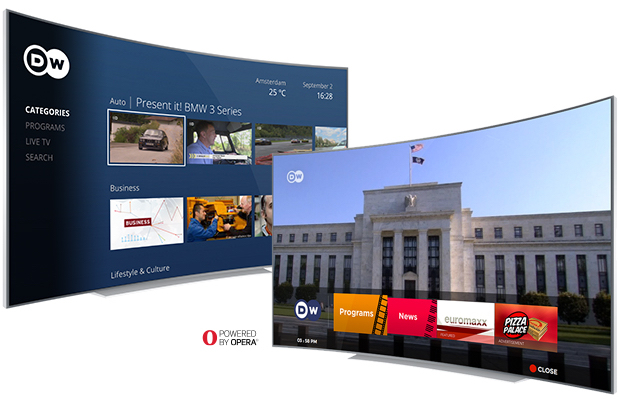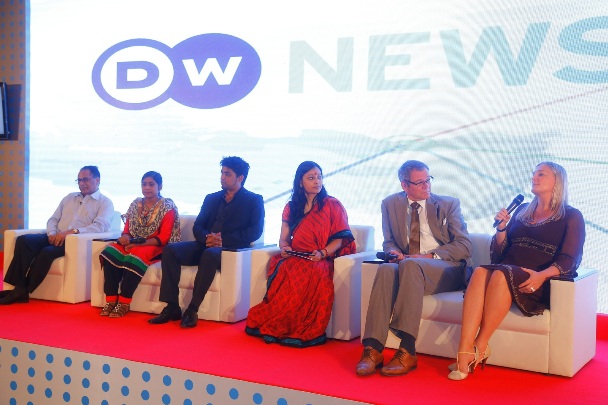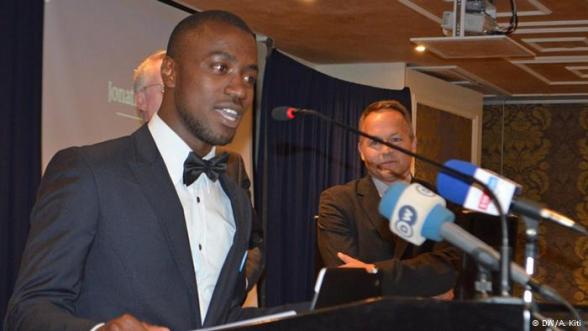Market roundup: September 2015
Digital
DW is one of the first broadcasters to make use of the latest in OTT services from Opera. In selecting Opera TV Snap for broadcasters, DW will leverage the latest version to enable users to access multilingual DW live programming and on-demand content, all from the comfort of their sofas. Viewers can access these services through the Opera TV Store app platform, available on tens of millions of devices from over 15 global manufacturers. Opera TV Snap providea broadcasters with expanded OTT capabilities on Smart TVs, including a ready-to-deploy Hybrid Broadcast Broadband TV (HbbTV) solution to drive seamless interactivity on linear TV.
“DW is committed to bring engaging content to our viewers. We’re excited to upgrade our Smart TV offering by utilizing the latest version of Opera TV Snap. We’ve found this path to be convenient in reaching Smart TV and HbbTV audiences,” says Petra Schneider, Director of Sales and Distribution at DW.
South America
Portuguese content from DW is now available on smart TVs, tablets and smartphones in Brazil via Moony, the new streaming platform from Samsung available for download on the Google Play Store or Galaxy Apps. DW has an exclusive place among 40 content providers that are on board for the roll out of the service. Moony users in Brazil have instant access to the latest episodes of popular DW shows like Futurando and Camarote.21 along with Portuguese content from DW Transtel including EinSteinchen ,Ecopia or From Tierra del Fuego to Tijuana.
Asia
DW has a new partner in Sri Lanka. The sports, lifestyle and business channel Carlton Sports Network (CSN) has aquired four DW shows including Drive it and In Good Shape. CSN reaches an estimated 2.5 million households in Sri Lanka.
DW’s Pakistani partner ATV is now broadcasting a DW news bulletin during prime time. The channel is the largest private television network in Pakistan, serving all major cities and commercial centers.
DW introduces new program and local heroes in Dhaka
DW was in Dhaka this week to provide journalists and media professionals a look at the the new 24/7 English news channel presented in cooperation with local partner Bangladesh Television (BTV). The flagship program, DW News, features a programming block that focuses on regional issues for Asia and content with regional significance in cooperation with local partners. These co-productions will maintain DW’s standards while allowing partners the flexibility to use their own graphics and on air personalities – a method that succeeds in combining international expertise with regional appeal.
In Bangladesh, DW reaches an audience of opinion leaders and people who are curious about learning and seeking information. Dorothee Ulrichs, DW’s Head of Asia Distribution said theses are people who aren’t satisfied with tag lines or headlines and want to “discover new places and understand the ‘why’ in the world around them”.
Part of the global launch of DW News last June was a promotional campaign that focused on the audience and highlighted local heroes in regions all over the world. Local heroes are people who make a difference in their communities by working, thinking, creating and innovating. Two Bangladeshi local heroes were guests at the launch in Dhaka. Their work sets an exceptional example.
Mahfuza Akter is an Infolady – volunteers who bike hundreds of miles a month to provide advice and medicine to thousands of people in remote, impoverished villages around the country. Using the Internet, they connect people with modernized methods and ideas that they cannot access elsewhere. Their work also earned them a 2013 DW Bobs online activism award. And Korvi Rakshand founded the JAAGO foundation in 2007, which provides education for disadvantaged children living in slums. The school also promotes volunteer action groups in Bangladesh through the initiative Volunteer for Bangladesh. The project has organized over 10,000 volunteers in Bangladesh who are working to enact positive social change.
Ensuring viewers get the big picture in Russia and Ukraine
What does the Russian information war mean for the news industry? International media play a major role in forming the narrative on the conflict between Russia and Ukraine – and polarization is increasing as opposing sides try to take the lead in covering events for people living in affected regions.
DW prides itself on providing a unbiased voice to the media landscape. And to ensure that even more people can benefit from fair and balanced news and information, DW is producing two new 10-minute news formats in Russian and Ukrainian. From Monday to Friday, DW Nowosti and DW Nowyny provide audiences with news coverage on regional and European issues that they won’t find elsewhere with the support of local Russian and Ukrainian correspondents.
Broadcasting partners of DW Nowosti are currently TV Rain in Russia, LRT in Lithuania, Yerkir Media in Armenia, GPB 2 in Georgia and YES TV in Israel. There are on-going negotiations to include more partners soon. All broadcasts of both formats are always available online.
Across the spectrum of issues, there is bias and a need for objective information. Since the beginning of the current conflict in Ukraine, DW has provided a third perspective that can help people get the big picture. Geofaktor, DW’s news magazine for the region has been on air since January 2014. This information conflict looks likely to continue into the near future and DW will continue to provide a standard of journalism that everyone can count on.
Russian media outlets are afflicted by a lack of objectivity – especially when reporting on events in Ukraine and eastern Europe. In a context that is packaged as professional journalism, innuendo, half-truths and outright lies can be propagated without any measure of veracity.
Media outlets from the “west” that take a hawkish stance on reporting Russian affairs tend to exacerbate the problem and can lend credibility to the assertions of Kremlin-controlled media. The best approach to address the tangled web of information coming out of Russian news outlets is to continue producing steady, solid and serious news reporting that maintains the core principles of journalism.
Market roundup: August 2015
Asia
DW has expanded its partnership with the Vietnamese telecommunications provider FPT. The cooperation will add DW‘s new English channel to the line up on FPT’s over-the-top (OTT) television service, bringing DW to another 5 million users across Vietnam. DW’s English channel is also currently available on FPT’s IPTV service on Channel 37. DW on FPT Play is an expansion on FTP‘s IPTV service, which has carried DW since 2009.
The Indonesian TV provider Sky LBS is now broadcasting DW’s English channel via cable, satellite and IPTV nationwide. Sky LBS can reach up to 35.8 households and has 123 national and international channels in its portfolio.
In Pakistan, DW is now available as a TV live stream on the website for FM 100. The website is one of the most popular in the country.
Latin America
DW has acquired its first web TV partner in Peru with Canal E. The online TV provider was launched in 2014 and offers educational and informational programming on its platform www.canale.pe an. Currently, Canal E is broadcasting Visión futuro from DW (Latinoamérica).
DW adds a new dimension to cooperating with African media
Across Africa from Kenya to Nigeria, a new media-savvy generation is emerging along with a new demand for opportunity, development and quality journalism. By reaching out to individuals, creating new partnerships and actively encouraging media development, DW has created a foundation for success in different African markets, while at the same time giving value back.
By adding value to partnerships and cooperating with local media in different regions, DW can help improve people’s lives with information and help set examples of transparency, legitimacy and professionalism in media.
DW’s international media development organization, DW Akademie, is very active in Africa and has been for over 50 years. DW Akademie’s first international project was a radio training program in Rwanda. Their newest initiative is a recently-signed partnership with Aga Khan University Graduate School of Media and Communications (AKU-GSMC) in Nairobi, Kenya.
The university is focused on developing media professionals for the Kenyan media market. DW is there to help guide and educate them with world-class standards of journalistic practice. In return, DW will gain valuable insight into the nuances of the local media landscape. The six-year agreement centers on the development of professional education and training standards for communications experts in East Africa. Through exchanging experience, competences and ideas, both sides will benefit. DW gains visibilty in an important media market and the courses at AKU-GSMC can improve and develop with the expertise and experience provided by DW Akademie.
Kenya is one of the quickest growing media markets in Africa and there is a burgeoning interest in media education amongst young Kenyans. The market is growing more competitive and innovative.
DW recently produced a journalism competition for young journalists in Kenya. They were asked to create a journalism project that profiled a local hero in their region. Local heroes are people who make a difference in their communities and help those around them. The competition was organized in cooperation with The Standard Group, which is the largest media company in Kenya. The competition showed how through cooperating with partners, DW can affect the lives of people in African target audiences while gaining valuable partners and a positive local image.
Nigeria is another important market for DW in Africa. DW has been expanding its presence in the region after adding two foreign correspondents last year in Lagos and recently signing a deal with Channels TV, the largest news broadcaster in Nigeria. The deal includes direct DW reports from the Frankfurt Stock Exchange produced exclusively for audiences in Nigeria. This example of coproducing and sharing technical capacity is a model for the future of how DW will provide international quality journalism to local audiences.
Programs like Focus on Africa and Crossroads Generation emphasize individuals who help to set examples and serve as role models. They provide examples that turn away from the image of the continent as only being beset by turmoil and focus on positive actions from a younger generation.
DW will succeed in African markets by working with partners, reaching people where they are, educating media professionals and promoting journalism education. These are all very positive steps with the consistent goal to improve the overall media landscape in African countries.











Feedback